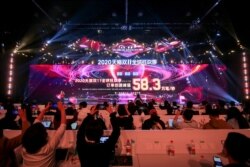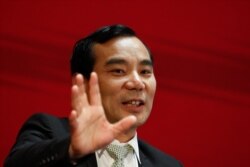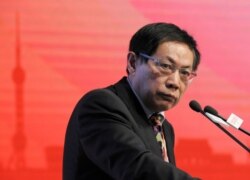China’s Jack Ma — onetime schoolteacher, billionaire co-founder and former chairman of tech giant Alibaba and philanthropist — is missing from the spotlight, and speculation about his fate is mounting because when high-profile Chinese figures disappear, arrests and prosecutions often follow.
Unseen in public since October, analysts say Ma may be lying low as Chinese authorities investigate his sprawling business empire after he made an incendiary speech days before the highly anticipated stock market listing of Alibaba’s financial affiliate, Ant Group.
The speech, delivered at the Shanghai Financial Summit on October 24, blasted China’s financial regulators as unreasonable and urged them to be more innovative. He also likened the Basel accords, the global banking regulatory system, to an "old people's club."
That was Ma’s last public appearance.
On November 2, financial regulators of the Chinese Communist Party (CCP) interviewed Ant Group executives and Ma, who no longer holds executive or board level positions at either of the companies he co-founded but is the largest individual shareholder of Alibaba with approximately 5%, worth some $25 billion.
On November 3, authorities suspended the Ant Group IPO. Scheduled simultaneously in Shanghai and Hong Kong for November 5, it was expected to generate $37 billion, which would have made it the world’s biggest IPO. At the time, The Wall Street Journal reported that Xi Jinping, president of the People's Republic of China and the CCP chief, had personally ordered the Ant Group IPO blocked after hearing Ma’s speech.
Later in November, Ma failed to appear to judge the finale of a game show he created, according to the Financial Times. He was replaced as a judge of the second season of Africa’s Business Heroes, a contest for entrepreneurs developed by Ma’s foundation, even though he had tweeted he "couldn't wait to meet the contestants."
On December 14, Beijing fined Alibaba Investment Limited, which is owned by Alibaba, 500,000 RMB, or $77,200, for violating antitrust laws, according to Reuters.
On December 24, China’s State Administration for Market Regulation (NIM) opened an investigation into Alibaba for possible monopolistic practices, and Alibaba stock lost more than $110 billion in market value that day.
A week later, the agency fined Alibaba's Tmall, an online business-to-consumer website, for antitrust violations.
On January 4, Bloomberg News quoted people familiar with the matter as saying that in early December Ma had been advised by Chinese authorities not to leave China. Also this week, an Alibaba spokesperson told CBS News that "no further information can be shared for now” about Ma’s whereabouts.
While some believe that Ma has left China, Ge Bidong, an economist based in Los Angeles and a current affairs commentator, told VOA that this is impossible. "No matter how powerful and rich he is, he wouldn’t be able to escape from China,” said Ge, who told VOA he was a political prisoner in China for seven years before arriving in the U.S. in 2018. “If he could leave, there is only one possibility — that is, the Chinese Communist Party wanted him to leave."
The German government-funded news outlet Deutsche Welle quoted analysts as saying that this episode represents just the beginning of Beijing's efforts to strengthen its control over China's increasingly powerful tech giants.
Gene Chang, retired professor of economics at the University of Toledo in Ohio, told VOA what is happening to Jack Ma is not just about Alibaba's monopoly power.
“Alibaba does seem to have a monopoly … but it can be solved through government regulation,” said Chang. “But if the government politicizes this regulation, fearing that private companies pose a challenge to communist rule, the economy will become a victim."
Ge, who also writes for the Epoch Times, told VOA that Alibaba's online shopping model is not only good for consumers, but also “stimulated a significant increase in physical production and led to an expansion of logistics."
Chang believes that market imbalances such as monopolies are natural consequences of economic development, and that it is the responsibility of government to use regulation to achieve the appropriate social balance.
“The government should come forward to digest or reduce the negative impact the transformation generates and balance social welfare," he said.
Ge said there is only one future for Alibaba: It will be transformed into whatever ownership the CCP wants, and “Jack Ma and people like him will be eliminated.”
And Ge’s certainty is part of what fuels the speculation. In June 2017, Wu Xiaohui, the onetime chairman of the vast and well-connected Anbang Insurance Group, disappeared from view only to resurface at trial in March 2018. He was found guilty of financial fraud and abuse of power and sentenced to 18 years.
In early 2020, Ren Zhiqiang, former chairman of the state-owned property developer Huayuan Real Estate Group, went missing after criticizing the government’s mishandling of the coronavirus outbreak.
In September, Ren, who once referred to Xi Jinping as a “clown,” was found guilty of corruption, having reportedly received an illicit gain of nearly $7.4 million, taken $184,500 in bribes and embezzled $8.9 million in public funds between 2003 and 2017.
Adrianna Zhang contributed to this report.








